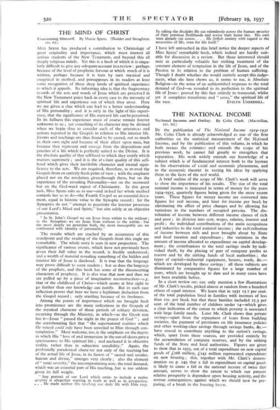THE MIND OF CHRIST
Miss SPENS has produced a contribution to Christology of
great originality and importance, which must interest all serious students of the New Testament, and beyond this all deeply religious minds. Yet this is a book of which it is singu- larly difficult to give any adequate account in a review : perhaps because of the level of prophetic fervour at which much of it is written, perhaps because it is turn by turn mystical and exegetical in method, and presupposes- in its readers at least some recognition of those deep levels of spiritual experience to which it appeals. Its informing idea is that the fragmentary records of the acts and words of Jesus which are preserved in the New Testament point back -in every case to the intensity of spiritual life and experience out of which they arose. Here we are given a clue which can lead to a better understanding of His personality ; and it is only in the light of this experi- ence, that the significance of His outward life can be perceived. In its fullness this experience must of course remain forever unknown to us ; yet something of its character may be divined when we begin thus to consider each of the utterances and actions reported in the Gospels in relation to His interior life.
.Events and teachings arc thus found to be sacred, not so much in their own right and because of their effect upon men, but because they represent and emerge from the dispositions and practice of a life which is perfectly united to the Divine. It is the absolute quality of that selfhood to which they testify which matters supremely ; and it is the at splute quality of this self- hood which gives their inevitable character and eternal signi- ficance to the acts. We are required, therefore, to re-read the Gospels from an entirely fresh point of view ; with the emphasis placed not on the revelation given through them, but on the experience of the revealing Personality—not on the manward but on the God-ward aspect of Christianity. In this great task, Miss Spens asks us to use—and indeed her whole method compels her so to do—the Fourth Gospel as an essential-docu- ment, equal in historic value to the Synoptic record ; for the Synoptics do not "attempt to penetrate the interior processes of our Lord's Mind and Spirit," but aim solely at an objective presentation.
" In St. John's Gospel we see Jesus from within to the without ; in the Synoptists we see Jesus from without to the within : but the more deeply we penetrate both, the more inescapably are we confronted with identity of personality."
The results which are reached by an acceptance of this standpoint and the reading of the Gospels from this angle are remarkable. The whole story is seen in new proportion. The significance of various events, which have not previously been given their full value in the record, is freshly understood; and a wealth of material revealing something of the hidden and interior life of Jesus is disclosed. It is true that the language may prove difficult to some readers ; but so does the language of the prophets, and this book has some of the disconcerting
characters of prophecy.. It is also true that now and then we
are pulled up by a piece of imaginative reconstruction—e.g. that of the childhood of Christ—which seems at first sight to go further than our knowledge can justify. But in each case reflection proves that here we have a legitimate deduction from the Gospel record ; only startling because of its freshness.
Among the points of importance which are brought back into prominence are the many indications in the Gospels of the mystical character of those periods of solitary devotion,
recurring through the Ministry, in which—as the Greek text has it—Jesus "passed the night in the prayer of God " ; and the corroborating fact that "the supernatural realities which He voiced could only have been unveiled to Him through con-
templation." Most welcome, too, is the emphasis on the degree in which His "love of and immersion in the out-of-doors gave a spaciousness to His spiritual life ; and anchored it in objective reality, rather than in subjective sensibility." Again, the profoundly paradoxical character not only of the teaching but of the actual life of Jesus, in its fusion of" sacred and secular, human and divine," emerges very clearly ; also the element of" tonic severity," the uncompromising note, the total demand, which was an essential part of His teaching, but is too seldom given its full weight.
"Any portrait of our Lord which omits to include a realist severity is altogether wanting in truth as well as in perspective. . He made neither His teaching nor daily life with Him easy. In calling the disciples He cut relentlessly across the human security of their previous livelihoods and across their home ties. His own were already cut across. . . . lie forbids anxiety with regard to the necessities of life, even for life itself."
I have left untouched in this brief notice the deeper aspects of Miss Spens' remarkable book, which indeed are hardly suit- able for discussion in a review. But those interested should note as particularly valuable her striking treatment of the constant element of temptation in the life of Jesus, and of the Passion in its relation to the problem of human suffering.
Though I doubt whether she would entirely accept this judge- ment, what she here shows us, it seems to me, is Absolute Religion—in the sense of an unblemished response to the total
demand of God—as revealed in its perfection in the spiritual life of Jesus : proved by this fact entirely to transcend, whilst yet it completes transforms and "saves," the spiritual life of














































 Previous page
Previous page